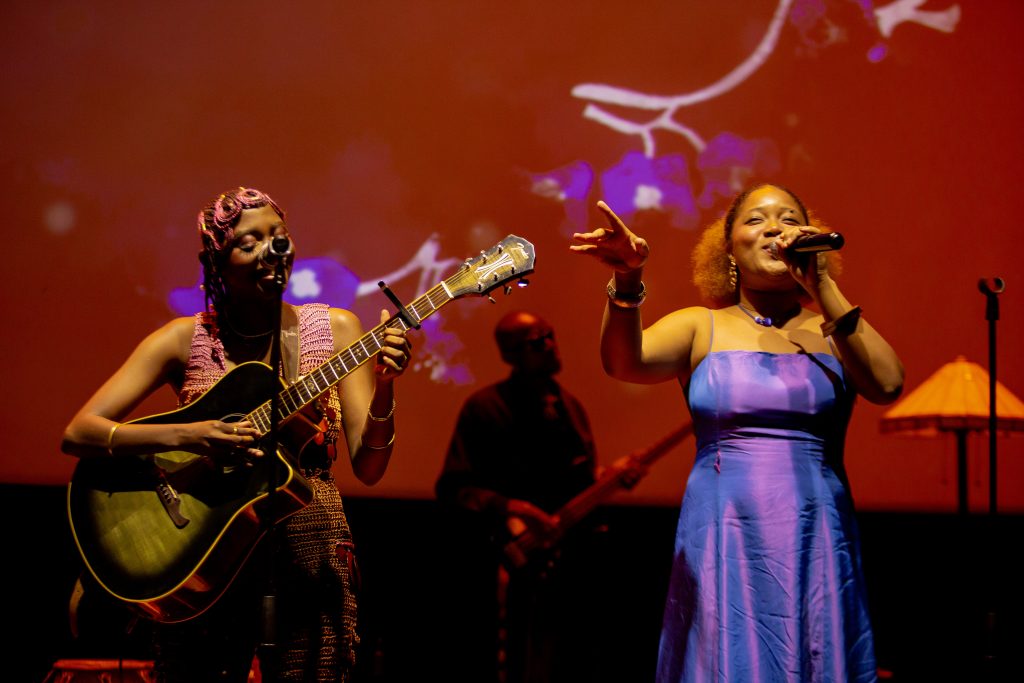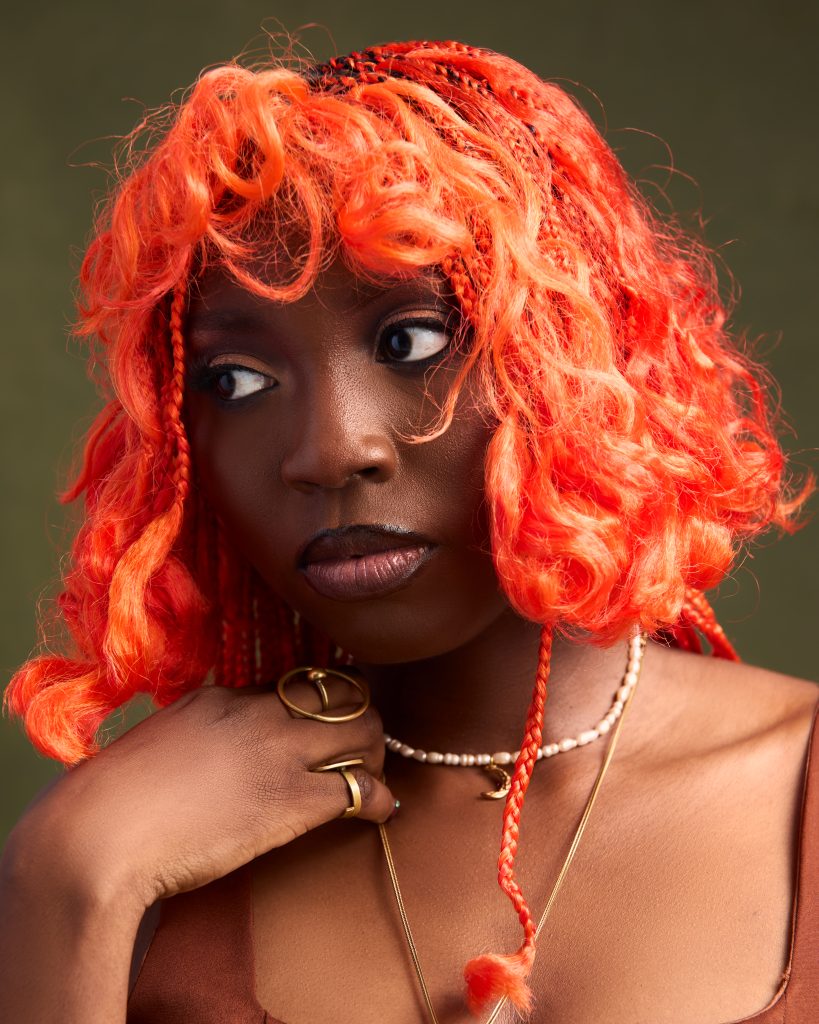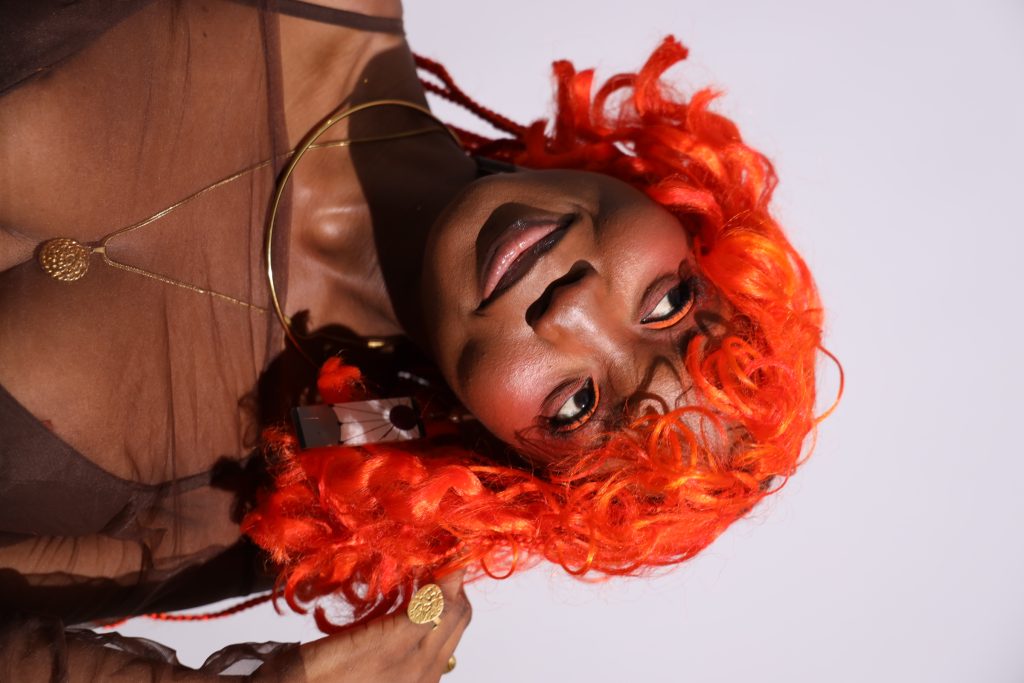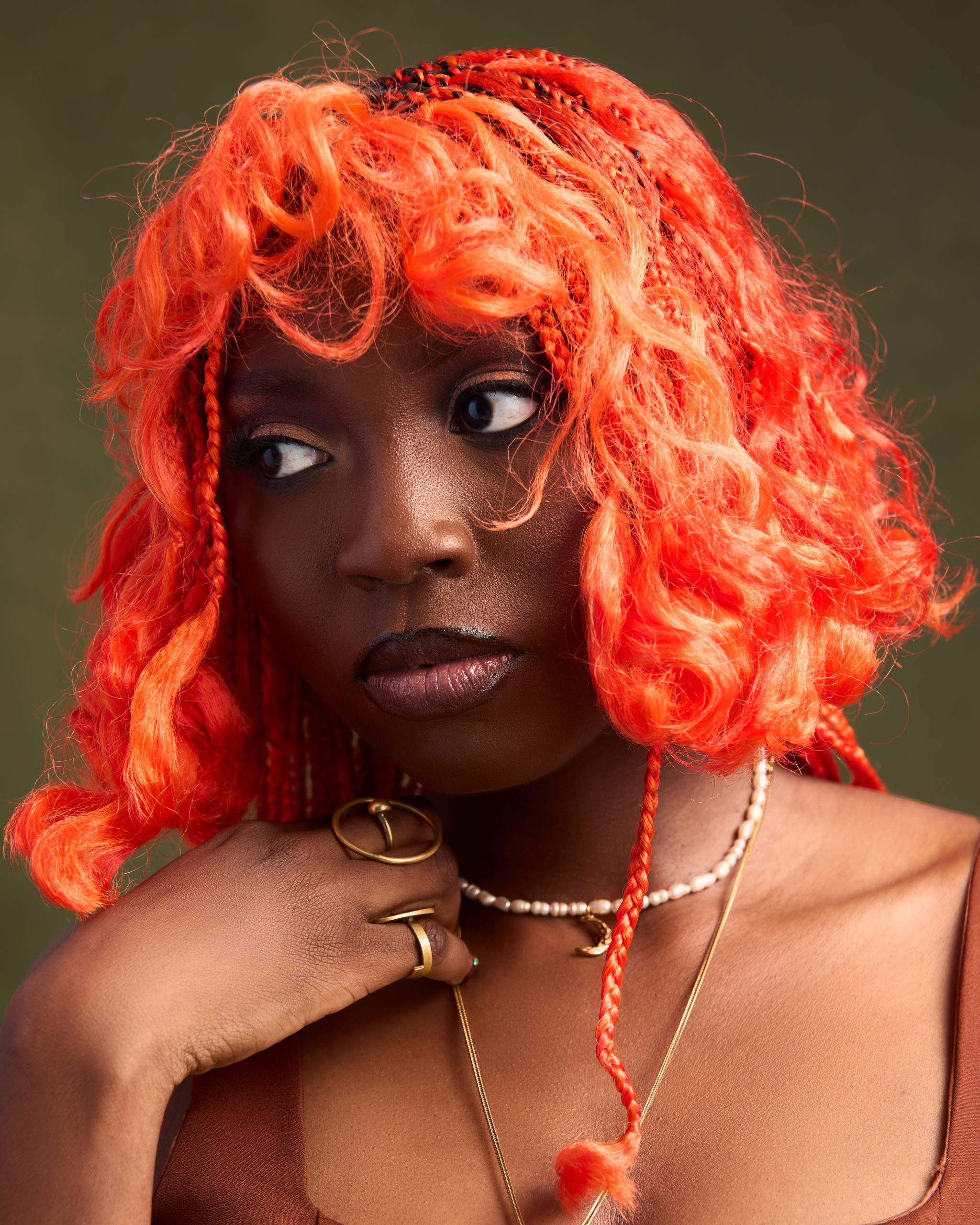One of my favorite things on Celeste’s socials is that video where they ask people, “If Celeste was a snack, what snack would she be?” I think about that often. I’m not sure what my answer would’ve been but I don’t think Celeste could be a snack. I don’t think I’ve ever tasted anything so simple yet so complex in its profile. Well, there’s chocolate, but Celeste isn’t chocolate. She doesn’t even like chocolate. I digress.
Celeste feels to me like a thousand colors: a woman with mutinous, ferocious grace. She seems open, daring, and creative; a woman who has simply bloomed. I think about her “beautiful ideas,” and how the inception of those ideas, which we receive as songs, might be fundamentally, deeply mysterious.

Her songs do not come to you with a specific concern. They aren’t political in that sense, nor are they didactic, not in the way you think. You see, they don’t even ask anything of you. Instead, they explore a mysterious, emergent idea which, if pursued, reveals at its core a necessary, universal message, bringing an entire world into existence. A world that opens up new and unknown terrain.
This is what I think of Celeste. This is why I’m here, watching my screen and waiting for her to appear on the other side of the call. For the most part, there’s an intense need to be shown this rich and uncertain world that offers fresh ways to comfort our collective hearts’ travails.
Moments later, she joins. “I joined the wrong link,” she says. I giggle a little. She sounds apologetic. I’m happy she’s here.
When Celeste finally settles in, our conversation begins with stories, the folktales she grew up listening to.
“Do you think these stories have shaped the way you tell yours, whether through poems or songs?” I ask.
“Yeah, to be honest,” she says. “I grew up listening to a lot of folk tales, and that’s a big influence. You can see it in my earlier project, Alo. That project was shaped by how I learned to see and retell stories.”
“Over time, though, I’ve drawn more from life. People, relationships, experiences. I’d say that’s what fuels my songwriting now. It’s not just memory anymore; it’s observation. The people around me, the things I see, how the world moves. That’s what shapes how I write.”
When I ask about her childhood, her voice grows gentler, thoughtful.
“I guess I was everyone’s child, or maybe the world’s,” she laughs. “There’s this question I always think about: if you could time travel, where would you go? I’d go to pre-colonial times, just to see how people lived in African societies before everything changed.”
She tells me about the time her family moved into a new home on the outskirts of town.
“It was so bushy back then,” she recalls.
“We were dealing with snakes and all kinds of animals. Slowly, people started moving in, and that’s when community started to take shape. During Christmas, children would go from house to house singing, and people would give them food or little gifts. It almost felt like trick-or-treat, but for Christmas.”

There’s a kind of lightness in her voice when she talks about the past, the kind that comes from remembering something that still warms you.
“In the evenings, before television became a thing, people would gather outside when the air was cool and tell stories. My neighbors would come over at night, and we’d just sit there listening. It didn’t last long. By the time I was six or seven, the neighborhood had grown and things changed. But I think those moments stayed with me. Maybe because I was a child, they made me see the world in a very curious way.”
I tell her it sounds like a very interesting childhood, I mean this. I ask, “If your childhood had a soundtrack, what songs do you think would be on it?”
She laughs softly before answering.
“I think if it had a soundtrack, it would really be the songs on Alo,” she says. “To be honest, my childhood felt like that project. I was just passing through the world in a very curious way, observing people, listening to their stories, trying to understand myself as a person — as a human being. So if I was to quantify it, I’d say my childhood was more of a visual project than anything else.”
I tell her that the sound on Alo carries a lot of the Yoruba language and imagery, and I’m curious what draws her to preserve that in her music.
“To be honest,” she begins, “it’s really the culture. That’s the identity I want to hold onto. I don’t want to be just one thing or one person. I want to reflect all the things I grew up with— what I listened to, and what I learned. A lot of the time, people are quick to discard African culture, to forget that there’s meaning in why we exist the way we do, why we have this language.”
Her voice steadies as she continues.
“Language is a very interesting thing. It’s a form of identity. So when I sing or write that way, it’s my way of saying, this is who I am. This is a particular identity that exists in the world.”
I tell her I imagine that, as much as she wants to preserve her roots, she’s still experimenting as much as she can.
“How do you find the balance between tradition and experimentation?” I ask.
“Yeah,” she says after a small pause. “I think, to be honest, that balance comes from the kind of music I grew up listening to. It was always a mix. There was Yoruba music like King Sunny Ade, there was highlife, and then my siblings were deep into rock. I also listened to Sade and a lot of jazz. So over time, all of that just became part of me.”
She speaks with a kind of ease now, as though explaining something she’s lived with for so long that it feels second nature.
“When I’m creating a sound or trying to come up with a melody, I try to infuse all those experiences. At the core of it, there’s always the tradition, the Yoruba in it. But in the instrumentation, you’ll hear a bit of Africanness, then a touch of modernity. Because to be honest, I’m still a modern person.”
She laughs softly before continuing.
“So most times, what I do is blend both worlds. You might hear a guitar line that feels contemporary, and then a talking drum slips in between. That’s my life in sound, it is a mix of what I grew up around and the world I’m in now.”
I ask, “You began as a completely independent artist. What did freedom look like to you then, and what does it feel like now?”
“Well, St. Claire, where I’m signed now, is also an independent label, so the difference isn’t that huge,” she says. “But what’s changed is experience. When I started making music, I didn’t have the network or exposure I do now. I’ve met more people, learned more, and that’s shaped how I approach my art.”
“Back then, things were much more limiting. Social media wasn’t what it is now. You had to go to industry nights or wait to be seen. But now, artists can create a song, start a dance, and it might go viral. The world has changed so much, even for independent musicians.”
She pauses. “So yeah. What’s really different now is experience, the way the world has evolved, and the fact that I’ve grown more confident. I know myself more. I know my sound.”
I ask, “In your project brief, I saw that you worked with Anabel Rose. I thought that was really interesting, mostly because I didn’t envision that. What do you hope people hear when they listen to it?”
She laughs softly. “I don’t know if you’ve heard the song, but maybe you should answer that for me,” she says. “Honestly, I think it’s very fun, and that’s who I am. People are often surprised because they expect something more ethereal from me. But for Our Time in the Sun, I wanted to do the exact opposite of Alo. Alo was night, calm, deep, moody sounds. Our Time in the Sun is day, bright, full of excitement and light.”
She pauses. “I’ve experienced a lot of love in my space lately, and that really influenced the project. That’s how Anabel Rose came in. She first found my music through Instagram ads and started commenting. When I wrote Traveler, I actually got the idea after attending a docu-series my friend Blossom invited me to. Luedji, a Brazilian artist, was there. She talked about Bahia, how the government funds art spaces for both emerging and established artists, and how the pace of life there is slow and intentional. I imagined a life far from Lagos where you didn’t have to rush or feel guilty for taking your time. I was so inspired by that conversation I could almost hear the melody forming while she spoke.”
She continues, “When I got home that day, I wrote the melody for Traveler. Initially, I wanted to work with Luedji, but access can be tricky. Around that time, I was talking to Anabel, and it just made sense. I reached out and said, ‘Hey, I have this song, would you like to be part of it?’ It also gave her the chance to stretch beyond her usual pop sound into something that touched softer rhythms. She loved it, and we made it happen.”
She laughs again. “I reached out to a bunch of people for Our Time in the Sun. I wanted to push the boundaries of my ancestry, and collaboration felt like the right way. It’s always been something that helps me grow.”
I tell her, “First of all, I really like the name Our Time in the Sun, it’s so easy and warm. And truthfully, I think Traveler does for you what you hope it does. It sounds like good escapism, like dancing in the morning.”
She laughs. “I’m happy you like it too. It’s not like you’re just ‘whining me,’ right?”
We share a laugh and I promise I’m not.
I ask, “What part of you do you think your listeners will never fully understand?”
“That’s a very interesting question,” she says. “Maybe just how much I like change. My sound will always be shifting. There’ll always be that surreal air, like Aurora has, but it’ll never stay the same. It won’t be jollof rice every time; it’ll be something new. I think my listeners don’t realize that yet, but as we keep going, they’ll see.”
I ask, “So, um, what would you say—this is a very random question, yeah—but what would you say your top five snacks are?”
It catches her by surprise. “My top five snacks? Interesting. Wow. You know, if you had asked me this years ago, when I used to like food a lot, I’d have had answers ready. But let me think.”
“Oh my God,” I exclaim. “You don’t like food anymore?”
She laughs. “It’s not like that. I think I’m just more interested in other things now, not necessarily food. But snacks, hmm. I really like ice cream. You’ll always find me with strawberry ice cream, and I love crunchy things. Not necessarily chin chin or plantain chips, but if it’s crunchy and it tastes nice, best believe I’m there. So, ice cream for sure. Then there’s this cake my friend’s sous chef makes—she’s a baker—and honestly, it’s like an experience. I don’t even know how to describe it, but it’s that good. So, ice cream, cakes… I’m not a fan of chocolate, unfortunately. I’ll eat it sometimes, but I’ll always choose ice cream over chocolate. What about you? What are your favorite snacks?”

“I’d say we pretty much have the same interests, except I love chocolate. I think it’s the greatest thing in the world.”
“That’s interesting,” she says, intrigued. “What do you like about chocolate? Is it the taste? What exactly?”
And for the first time, I realize I have no idea. “It’s just chocolate,” I say, laughing. “I have no idea why.”
She laughs too. “That makes sense. You don’t always have to know why you like something. If it makes you comfortable or soothes you, that’s reason enough.”
I ask, “If you were to describe yourself as a color, what color do you think you’d be?”
“I’d be very bright lights, a blend of colors,” she says. “Extremely sparkly. Very sparkly. That’s one thing I’d definitely be.”
“Yeah, I see that,” I say. “For some reason, I associate you with purple and sparkles.”
She laughs. “You’re not wrong. I used to like purple at some point.”
Finally, I ask, “Do you have a personal philosophy that pretty much guides your choices and actions?”
She thinks for a moment. “Yeah, I think for me, it’s about treating people the way I’d like to be treated. I always try to keep my space safe, and make sure the people within it are just as invested in me as I am in them. That’s something that’s hard to find these days. My philosophy is to keep being a good person—it’s tough, but I want to stay that way. I also want to recognize others who are good, doing things with genuine hearts, and make sure they get good things too. The world can be really crazy, and it often rewards the mean ones, so I try to stay soft in spite of that.”
We end there. I’ve had an amazing time speaking with her. She is light and amazingly, she is filled with so much warmth. Listening to Celeste talk about her world, I realize her music is actually a lot more than what she sounds like — angelic as may be and it’s also about what she awakens in you. She reminds me that creation doesn’t always ask to be understood; sometimes it only asks to be felt. And maybe that’s what makes her music so magnetic—it moves gently, like sunlight across water, revealing something different each time you return to it.
Authored by NEONE ADEBAYO

